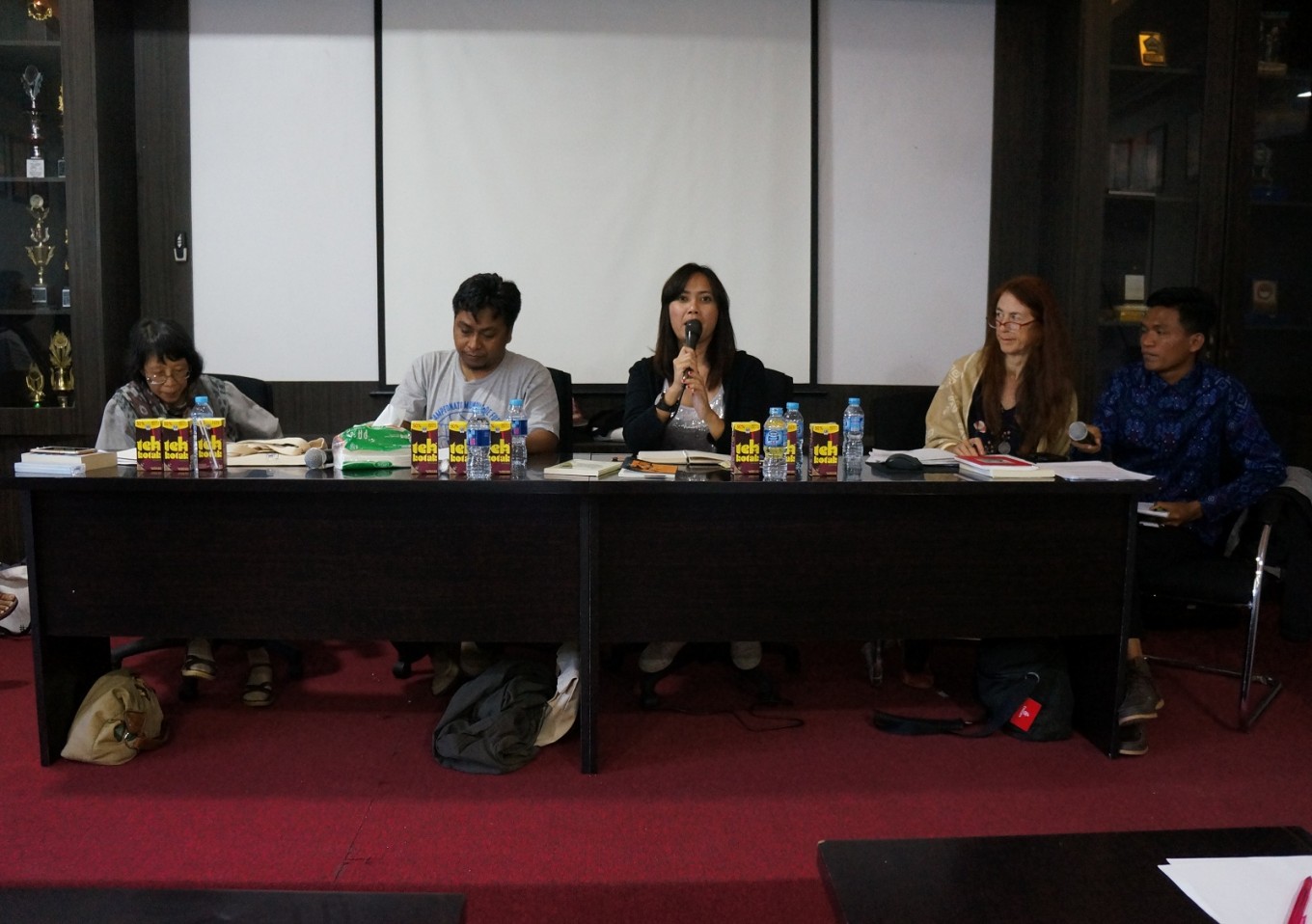Popular Reads
Top Results
Can't find what you're looking for?
View all search resultsPopular Reads
Top Results
Can't find what you're looking for?
View all search resultsLiterature plays crucial role as Indonesia enters 20th year of reformation
Change text size
Gift Premium Articles
to Anyone
 The speakers at the “20 Years of Reform” discussion, one of the events at the Makassar International Writer Festival in Makassar Muhammadiyah University, Makassar, South Sulawesi on May 3, (from left) University of Indonesia cultural science professor Melani Budianta, writer Mahfud Ikhwan, former journalist and writer Dewi Ria Utari, writer and performer Jan Cornall and her interpreter. (JP/Keshie Hernitaningtyas)
The speakers at the “20 Years of Reform” discussion, one of the events at the Makassar International Writer Festival in Makassar Muhammadiyah University, Makassar, South Sulawesi on May 3, (from left) University of Indonesia cultural science professor Melani Budianta, writer Mahfud Ikhwan, former journalist and writer Dewi Ria Utari, writer and performer Jan Cornall and her interpreter. (JP/Keshie Hernitaningtyas)
A
s Indonesia celebrates its 20th year of reformation this year, literature plays a crucial role in reminding us of the importance of learning from history, says University of Indonesia cultural science professor Melani Budianta.
“The reformation may still feel new for some people, yet it has changed [many things] rapidly that we need to look back to process it. Learning from history is very important so that we don’t forget what we are fighting for and make the same mistakes all over again. Why literature? Because it has the potential to open our imagination; allowing us to imagine something outside of what exists today,” said Melani during a discussion themed “20 Years of Reform”, among the events at the Makassar International Writers Festival that took place at Makassar Muhammadiyah University on Thursday.
However reformation comes at a price, she added.
“[Tempo veteran journalist and author] Leila S. Chudori's Laut Bercerita [The Sea Speaks His Name] tells a fantastic story about the [New Order regime] and students’ lives at that time; how if you touched a [banned] book, or owned one, you could go to prison. Not only that, you could have been tortured or even killed and nobody would have known where you had gone. Something that we couldn't imagine [happening] today.”
“In this Reform Era, you are not allowed to ban [someone] from reading a book, or from writing any book. Unfortunately, we didn’t learn from the past. Hence despite the freedom [we now enjoy] everywhere, it also reaps violence. The one censoring the books are not the government; but the communities who burned the books they don’t like. We used to fight Soeharto as a common enemy, but now who are we fighting? Our own brothers that we consider to be different; putting ourselves in boxes based on religion, tribe and race,” said Melani.
“As we are currently being divided by fake news [spread] on social media and WhatsApp, reading literature works becomes important to allow you to discover what different people look like; realizing that they are also multidimensional human being that you cannot simply put into a box. Through literature we are able to enter other people’s perspective; feel their soul, get into their skin and body.”
Literature mostly voiced the opinions of the minority, said Melani, especially those who being oppressed or left behind; whose voice we rarely heard.
Read also: Six UK publishers join 'Literature Visit' to Jakarta, Makassar
Speaking in front of students and lecturers, she added that those who found themselves unable to share their thoughts through writing could try to be a listener instead. “You’ll find yourselves listening to inspiring stories from your grandmother, neighbors, newspapers or whatever is around you. We can listen and then we can channel the information into writing; in our own different way.”
“Different stories offer different perspectives, which sometimes we don’t know because we’re too caught up with our own community and people who are similar to us.”
Meanwhile, former journalist and writer Dewi Ria Utari shared at the discussion how fiction writers were enjoying more freedom when releasing their works amid the rise of persecution by local communities.
“Last week I watched the screening of short film Maha Guru Tan Malaka by Daniel Rudi Haryanto, which was banned in Padang, where the national hero actually hailed from. It’s an irony since [I found the movie] to be moderate. Books on PKI [the Indonesian Communist Party] also received persecution threats from anti-communist alliances since 2001 until 2016,” said Ria.
“I think non-fiction works indeed faced more threats from social groups, not only officials. Laut Bercerita, for instance, was released without any fuss. This means entering the 20th year of reformation, there’s more freedom in writing fiction compared to non-fiction, as well as in films.”










